|
|
|
Sort Order |
|
|
|
Items / Page
|
|
|
|
|
|
|
| Srl | Item |
| 1 |
ID:
120328
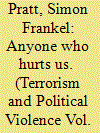

|
|
|
|
|
| Publication |
2013.
|
| Summary/Abstract |
This article examines the evolving logic to the systematic assassinations of Palestinian activists carried out by Israel during the Aqsa Intifada (September 2000-2005). It argues that the logic of Israel's "assassination policy" developed in three stages. During each successive stage, the security executive expanded the scope of who could be legitimately targeted and what goals could be served in doing so. This article further argues that normative and legal considerations played a key role in determining target selection and tactical means. It finds that during the Aqsa Intifada, the Israeli government used assassination not according to any unified purpose but rather as an evolving and often ad hoc combination of political communication, tactical action and, more rarely, strategic manipulation. In short: there was not one single rationale driving the assassinations but several.
|
|
|
|
|
|
|
|
|
|
|
|
|
|
|
|
| 2 |
ID:
120326
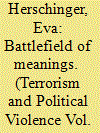

|
|
|
|
|
| Publication |
2013.
|
| Summary/Abstract |
For nearly forty years, debates on a definition of international terrorism as part of a comprehensive convention have been preoccupying the United Nations. This article challenges conventional approaches referring to divergences in national interests and preferences, or to institutional constraints and national legal traditions, to explain why no definition has been agreed upon. It analyzes the inconclusive debates from a critical perspective and argues that the continuous search for a definition can be understood through the prism of collective identity struggles: the desire to define terrorism is not only the desire to give a precise content to terrorism and, thereby, create the identity of an Other. It is also the desire to create a collective identity, a "Self," representing and uniting those who oppose terrorism. By applying a discursive understanding of collective identity construction to analyze the UN debates, the article elucidates how strongly the definition of terrorism hinders a common understanding among those who are opposing terrorism. Thereby, the analysis highlights that the demonization of terrorism foremost impedes a homogeneous understanding of a collective Self, ready to confront and define terrorism in the first place.
|
|
|
|
|
|
|
|
|
|
|
|
|
|
|
|
| 3 |
ID:
120329
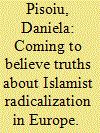

|
|
|
|
|
| Publication |
2013.
|
| Summary/Abstract |
This article addresses four assumptions behind many of the current theoretical and policy approaches to individual processes of Islamist radicalization in Europe: the association with terrorism and extremism; determinism; the extraordinary nature of radicals; and the reification of the grievance and collective identity discourse. It argues for an intentional and developmental, rather than structural and socio-economic feature-focused, approach to the explanation of the radicalization process, with the consideration of framing and socio-psychological mechanisms having an impact on individual decision-making processes, and for an overall, broader conceptual understanding of radicalism.
|
|
|
|
|
|
|
|
|
|
|
|
|
|
|
|
| 4 |
ID:
120331
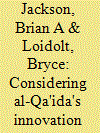

|
|
|
|
|
| Publication |
2013.
|
| Summary/Abstract |
Understanding how terrorist groups innovate and adapt is key for anticipating future shifts in terrorist threats. Past innovation studies have identified factors that shape group behavior, as well as the importance of combining study of organizations' innovation doctrines with data on how these doctrines are put into practice. Here we describe such an analysis for two texts that have shaped al-Qa'ida and its associated movements' strategies: contrasting Naji's Management of Savagery with al-Suri's Call to Global Islamic Resistance-including elements of the latter relevant to innovation specifically translated for this work. Though open source data on the groups' innovation practices are necessarily more sparse, we contrast the doctrinal texts with selected examples, which suggest caution in assuming that group doctrine is necessarily put into practice "as written."
[Supplemental materials are available for this article. Please visit the publisher's online edition of Terrorism and Political Violence for the following free, supplemental resource: Translation of portions of Abu Mus'ab al-Suri's The Call for Global Islamic Resistance, relating to innovation and learning.]
|
|
|
|
|
|
|
|
|
|
|
|
|
|
|
|
| 5 |
ID:
120332
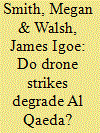

|
|
|
|
|
| Publication |
2013.
|
| Summary/Abstract |
The United States has used unmanned, aerial vehicles-drones-to launch attacks on militants associated with Al Qaeda and other violent groups based in Pakistan. The goal is to degrade the target's capacity to undertake political and violent action. We assess the effectiveness of drone strikes in achieving this goal, measuring degradation as the capacity of Al Qaeda to generate and disseminate propaganda. Propaganda is a key output of many terrorist organizations and a long-standing priority for Al Qaeda. Unlike other potential measures of terrorist group activity and capacity, propaganda output can be observed and measured. If drone strikes have degraded Al Qaeda, their occurrence should be correlated with a reduction in the organization's propaganda output. The analysis presented here finds little evidence that this is the case. Drone strikes have not impaired Al Qaeda's ability to generate propaganda.
|
|
|
|
|
|
|
|
|
|
|
|
|
|
|
|
| 6 |
ID:
120325


|
|
|
|
|
| Publication |
2013.
|
| Summary/Abstract |
No matter how unlikely it may seem, radical Leftists and Islamists have come closer in recent years. Drawing on substantial ideological interchange, and operating at both state and non-state levels, the two movements are building a Common Front against the United States and its allies. In this article, we use framing theory to examine the contemporary convergence of political Islam and the radical Left. Both radical Leftists and Islamists have utilized the master frame of anti-globalization/anti-capitalism and the master frame of anti-colonialism/anti-imperialism to elicit support from the widest possible range of people. The emerging Red-Green alliance presents a complex challenge that will require careful attention from U.S. and European policymakers.
|
|
|
|
|
|
|
|
|
|
|
|
|
|
|
|
| 7 |
ID:
120330
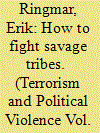

|
|
|
|
|
| Publication |
2013.
|
| Summary/Abstract |
The Bush administration's "Global War on Terror" has, by both defenders and critics, been characterized as unique. However, as this article shows, there is a long tradition, both in the United States and in Europe, of fighting wars against "savage tribes"-against enemies who fail to make a distinction between soldiers and civilians, and who use terror as a weapon. The problem of how to fight such groups was much discussed in the legal literature of the nineteenth century. This is a discussion from which it is possible to learn contemporary lessons.
|
|
|
|
|
|
|
|
|
|
|
|
|
|
|
|
| 8 |
ID:
120324
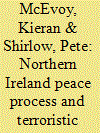

|
|
|
|
|
| Publication |
2013.
|
| Summary/Abstract |
In their article published in this journal, 1 Edwards and McGrattan charge that some of us who have written about the peace process in Northern Ireland "risk complicity in reproducing the terroristic narratives that inspired and perpetuated the conflict" (p. 357). Although the McCarthy-like logic of this argument would not normally warrant a scholarly response-if one studies, writes about, or heaven forbid seeks to understand Republicanism or Loyalism one risks reproducing "terroristic" narratives (whatever these are)-the piece is so riddled with inaccuracies, false dichotomies, and tendentious claims that we have been moved to reply. Moreover the introductory hook to their argument-that the Northern Ireland example of peacemaking is being misinterpreted in terms of countering violent Islamic extremism in Britain-requires that their arguments be critiqued lest they be taken seriously in policy circles.
|
|
|
|
|
|
|
|
|
|
|
|
|
|
|
|
| 9 |
ID:
120327
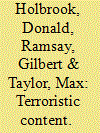

|
|
|
|
|
| Publication |
2013.
|
| Summary/Abstract |
In this article we offer a first attempt at providing a set of universal grading criteria for determining on what basis, and how far, an item of discursive content can be considered "terroristic." In doing so, we draw loosely on the existing COPINE scale for child abuse images. The scale described in the article is not intended to reflect actual risk of engagement in terrorist violence, nor is it intended to have evidential validity in relation to offenses in certain jurisdictions relating to "terrorist publications." Rather, by formalising assumptions which seem already to be latent in the literature on terrorist use of the Internet, it aspires to serve as a starting point for a more methodologically coherent approach to relationships between content-particularly online content-and terrorism.
|
|
|
|
|
|
|
|
|
|
|
|
|
|
|
|
|
|
|
|
|